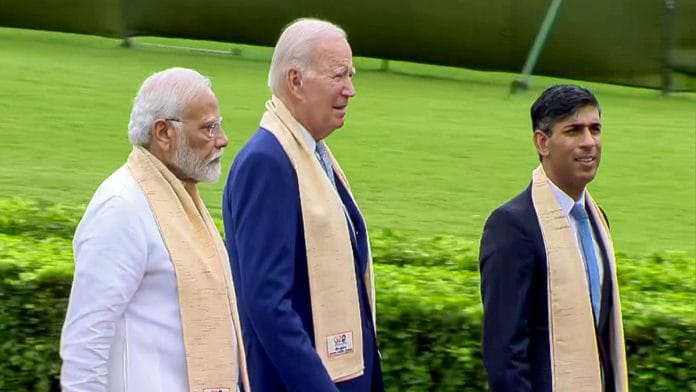New Delhi: The US and the UK Saturday came out in support of Canada’s claims that India’s demand for diplomatic parity is in “violation of international law and the Vienna Convention”. While the UK statement said it did “not agree with the decisions taken by the Indian government”, the US noted that it was “concerned by the departure of Canadian diplomats”.
Meanwhile, observing that India’s decision will impact millions of lives, Canadian Prime Minister Justin Trudeau Saturday said that the action taken by India was “completely unreasonable and escalatory”.
“India accredited each and every one of the Canadian diplomats they are now expelling. And all of those diplomats were carrying out their duties in good faith, and to the greater benefit of both countries,” he said while addressing the media in Canada.
This comes a day after Canadian Foreign Affairs Minister Mélanie Joly announced that Ottawa has withdrawn 41 diplomats and 42 dependents following an ultimatum by India.
“Resolving differences requires diplomats on the ground. We have urged the Indian government not to insist upon a reduction in Canada’s diplomatic presence and to cooperate in the ongoing Canadian investigation,” the US Department of State noted.
It added: “We expect India to uphold its obligations under the 1961 Vienna Convention on Diplomatic Relations, including with respect to privileges and immunities enjoyed by accredited members of Canada’s diplomatic mission.”
New Delhi had rejected Ottawa’s allegation Friday, stating that its actions were “fully consistent with Article 11.1 of the Vienna Convention”.
“We reject any attempt to portray the implementation of parity as a violation of international norms,” the Indian foreign ministry added.
Also Read: No end to Trudeau flip-flops: Backing Israel’s right to defend itself to ‘deep concern’ for Gaza
‘Decision to seek parity was conveyed to Canada’
ThePrint Friday reported that Joly observed that New Delhi gave “no good reason” for the overnight withdrawal of diplomatic immunity of its staff in India and that its reaction was “not measured”. She also stated that Canada would not be retaliating.
“I can confirm that India has formally conveyed its plan to unilaterally remove diplomatic immunity for all but 21 Canadian diplomats and dependents in New Delhi by tomorrow, October 20. This means 41 Canadian diplomats and 42 of their dependents were in danger of having immunity stripped on an arbitrary date and this would put their safety at risk,” said the Canadian foreign affairs minister.
However, government sources told ThePrint that India’s decision to seek parity was conveyed to Canada around a month ago, with a target implementation date of 10 October 2023. “This date was extended till 20 October as details and modalities of implementation, including the list of Canadian diplomats who would continue to be accorded diplomatic immunities and privileges, were being worked out in consultation with the Canadian side.”
“Attempts by Canada to portray this as an ‘arbitrary’ and ‘overnight’ decision are factually inaccurate,” one of the sources said.
Moreover, the source explained, “Our action is as per provisions of Article 11.1 of the Vienna Convention on Diplomatic Relations (VCDR), which provides the receiving state the right to limit the size of a diplomatic mission to what it considers reasonable and normal, having regard to circumstances and conditions in the receiving State and the needs of the particular Mission.”
“Article 11.1 has been used in the past by other countries on many occasions.”
The source further said: “Canada’s domestic legislation itself provides for comparable treatment of foreign diplomats in Canada to what its own diplomats get in a foreign country, as well as withdrawal of any of their diplomatic privileges and immunities.”
India-Canada diplomatic row: From Nijjar killing to parity
India had repeatedly sought ‘parity’ in diplomatic presence amid its ongoing row with Canada.
Last month, Trudeau accused the Indian government of being involved in the killing of Sikh separatist Hardeep Singh Nijjar. Nijjar was reportedly shot dead by unidentified assailants on 18 June in Surrey, Canada.
India rejected Trudeau’s allegations, calling them “absurd and motivated”. The two countries have also expelled each other’s diplomats.
The MEA Friday stated, “The state of our bilateral relations, the much higher number of Canadian diplomats in India, and their continued interference in our internal affairs warrant a parity in mutual diplomatic presence in New Delhi and Ottawa”.
Canada has also updated its travel advisory urging citizens to “exercise a high degree of caution in India due to the threat of terrorist attacks throughout the country”. It has also suspended in-person diplomatic services at the consulates in Chandigarh, Mumbai and Bengaluru.
However, according to government sources, parity was only sought in missions in Ottawa and New Delhi and should not impact Canadian diplomats in consulates in Bengaluru, Mumbai and Chandigarh.
“The Canadian decision to cease operations of their three consulates in India, is unilateral, and not related to the implementation of parity,” one of the sources told ThePrint.
(Edited by Richa Mishra)
Also Read: Justin Trudeau’s 15 seconds of fame—undoing two decades of India-Canada rebuilding ties






